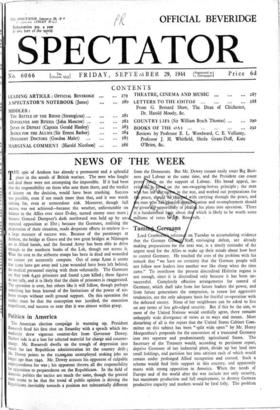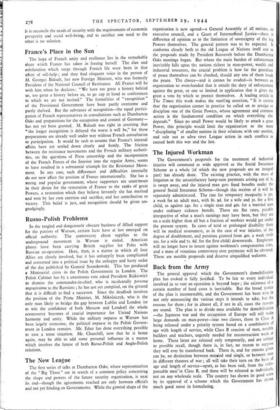Tam Germans
Lord Cranbo referen• on Tuesday to accumulating evidence that the German Staff, envisaging defeat, are already
making preparations for t e next war, is a timely reminder of the urgent need for the Allies to make up their minds about how best to control Germany. He touched the core of the problem with his remark that " we have no certainty that the German people will not follow new leaders into another war like sheep when the time came." To overthrow the present discredited Hitlerite regime is not enough, since it is discredited only because it has been un- successful. Completely effective arrangements for control of Germany, which shall take from her future leaders the power, and from future generations the temptation, to renew her aggressive tendencies, are the only adequate basis for fruitful co-operation with the defeated enemy. None of her neighbours can be asked to live on any terms of less gilt-edged security. But if this be the aim, as most of the United Nations would cordially agree, there remains unhappily wide divergence of views as to ways and means. Most disturbing of all is the report that the United States Cabinet Com- mittee on this subject has been "split wide open" by Mr. Henry Morgenthau's proposals for the conversion of a truncated Germany into two separate and predominantly agricultural States. The Secretary of the Treasury would, according to persistent report, deprive Germany of her industrial plant, divide up her land into small holdings, and partition her into sections each of which would remain under prolonged Allied occupation and control. Such a scheme would find little support in this country, and apparently meets with strong opposition in America. When the needs of Europe and of the world after the war include not only security, but maximum production and full employment, to destroy German productive capacity and markets would be fatal folly. The problem
is to reconcile the needs of security with the requirements of economic prosperity and social well-being, and to sacrifice one need to the other is no solution.



























